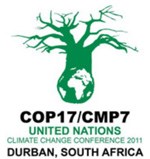
Top stories


Marketing & MediaWarner Bros. was “nice to have” but not at any price, says Netflix
Karabo Ledwaba 21 hours



Logistics & TransportMaersk reroutes sailings around Africa amid Red Sea constraints
Louise Rasmussen 14 hours

More news


















Speaking at a church service on Sunday 4 December organised by the South African Council of Churches in Durban, Nkoana-Mashabane said since the conference commenced, she has held extensive formal and informal consultations with parties.
"I intend to continue with these consultations in an open and transparent way as the negotiations progress, not only to keep parties fully informed, but also for myself to get a sense of where special attention is required before it becomes a problem."
Nkoana-Mashabane said Durban could take two central, decisive steps to make the world more climate-resilient and to put it on a low carbon path.
The one step related to how governments would work together to achieve their common goal of limiting the global temperature rise to a level that could prevent the worst ravages of climate change.
"This means answering the very important question of the future of the Kyoto Protocol. The Protocol is the main multilateral system where states cooperate to address climate change. Durban is a decisive moment for the future of this multilateral rules-based regime," said Nkoana-Mashabane.
The first commitment period of the Kyoto Protocol is coming to an end in 2012.
The other major step related to completing what was agreed on last year at the UN Climate Change Conference in Cancun.
"I am pleased to report that we concluded the first week with clear progress being made on the institutions that were agreed in Cancun," said Nkoana-Mashabane.
SAnews.gov.za is a South African government news service, published by the Government Communication and Information System (GCIS). SAnews.gov.za (formerly BuaNews) was established to provide quick and easy access to articles and feature stories aimed at keeping the public informed about the implementation of government mandates.
Go to: http://www.sanews.gov.za